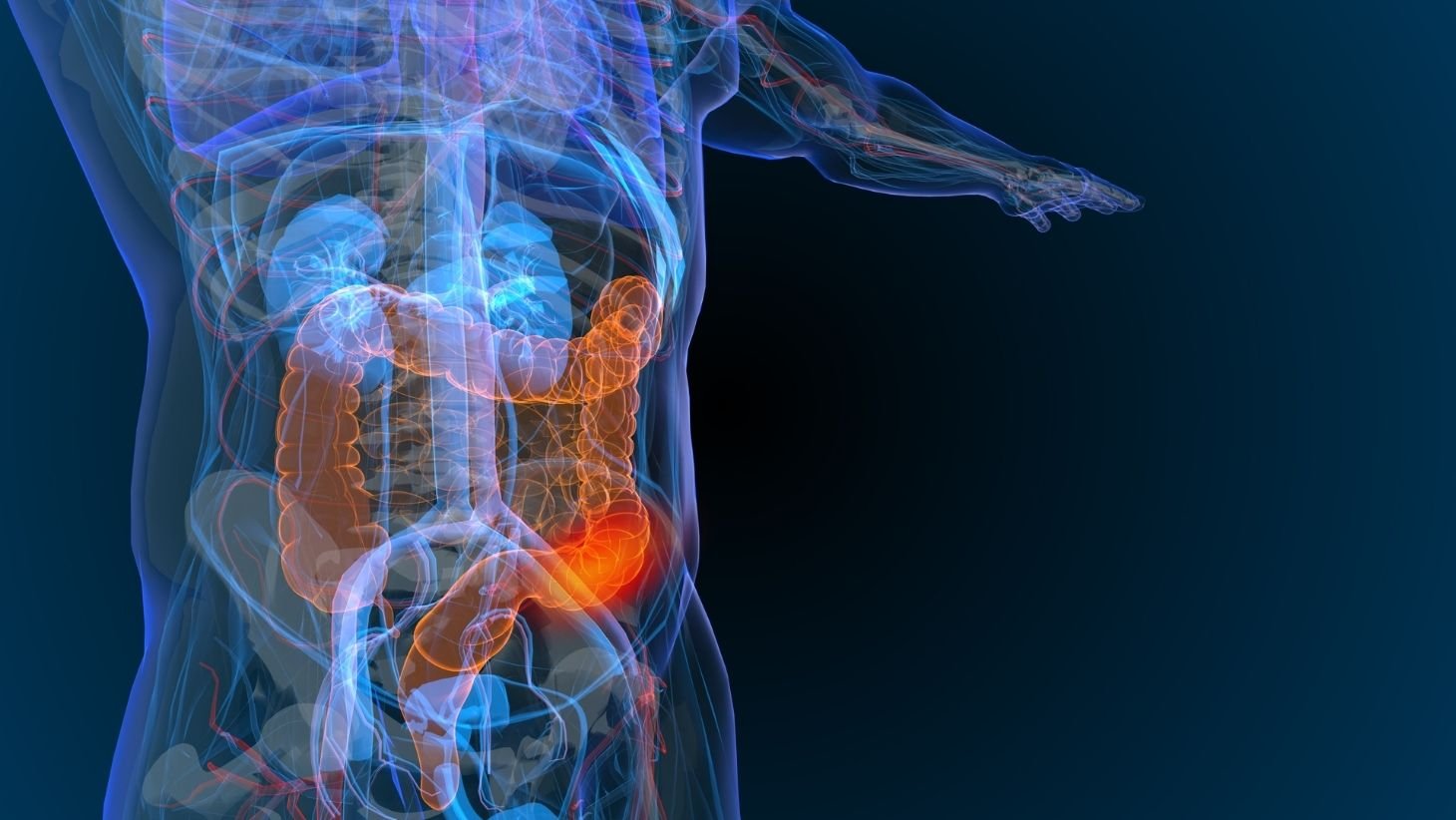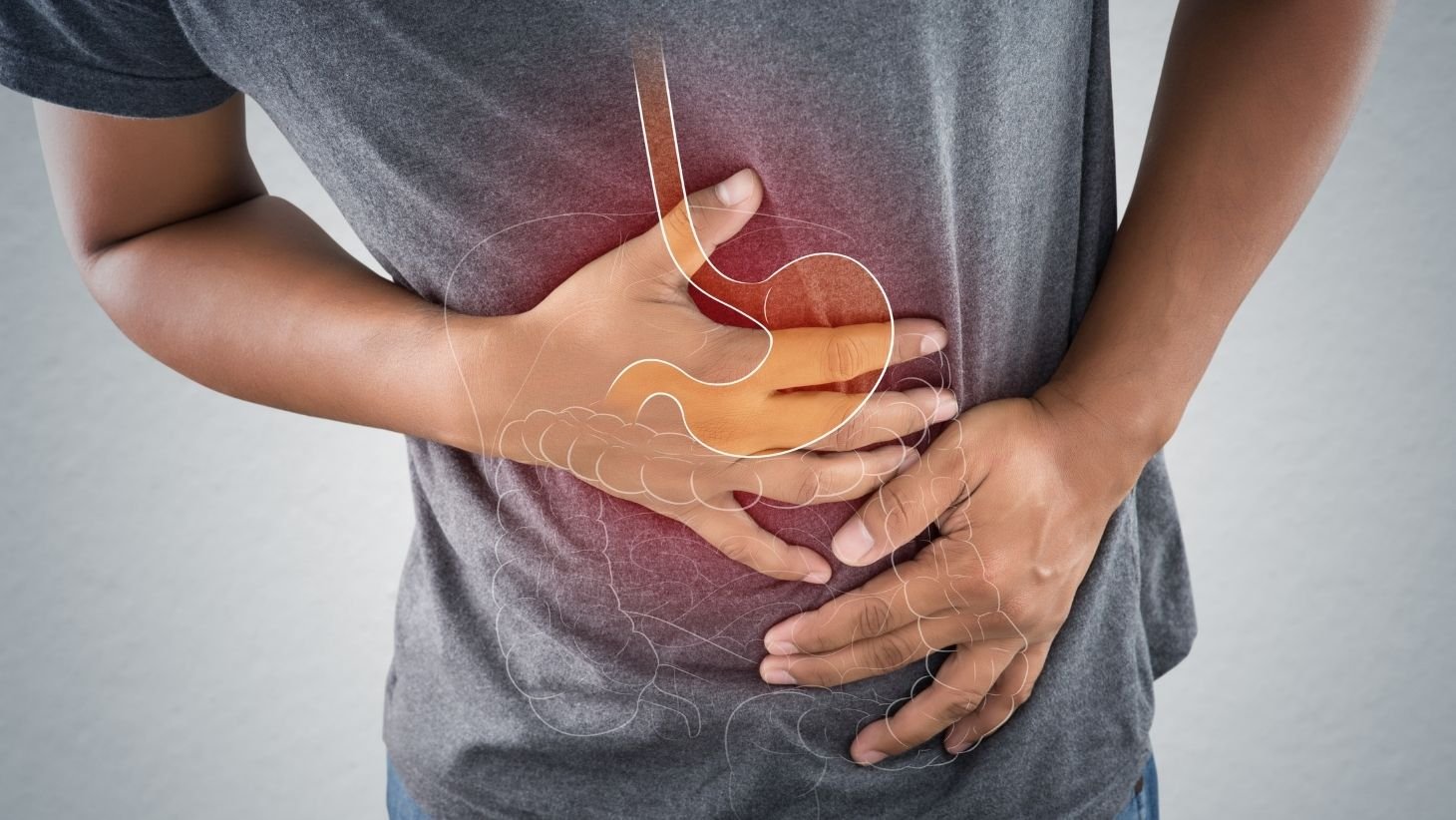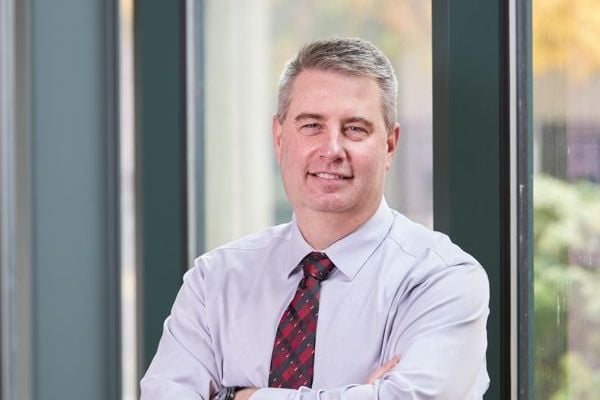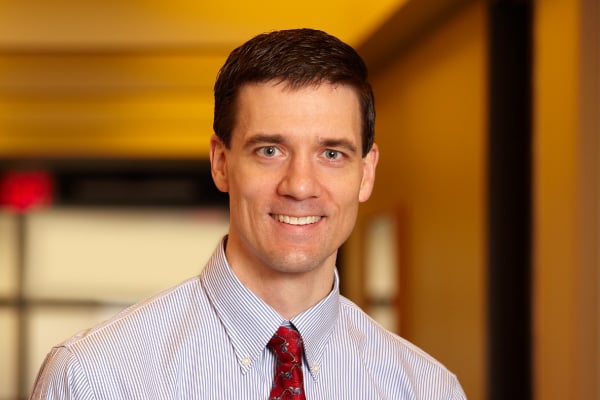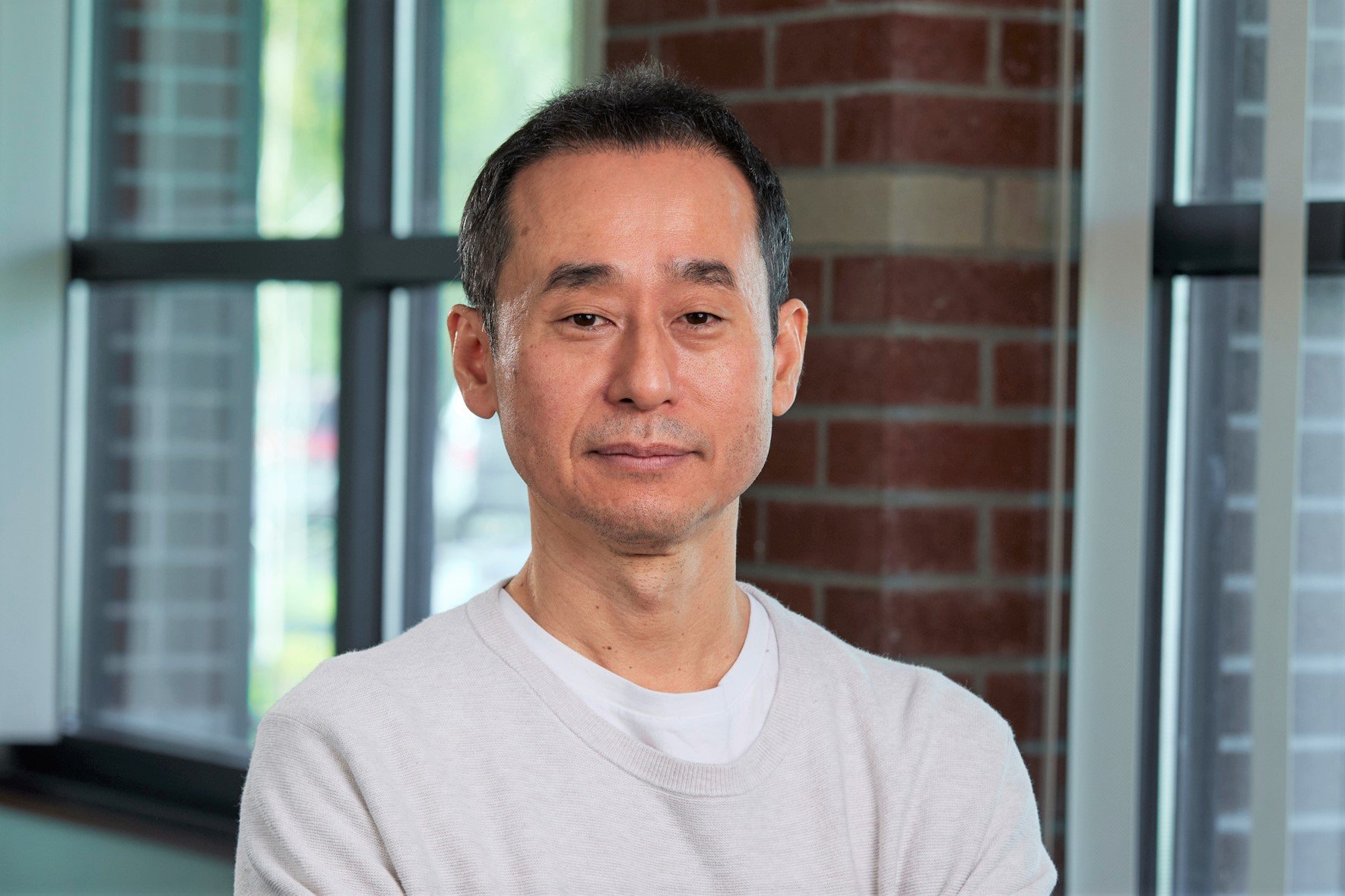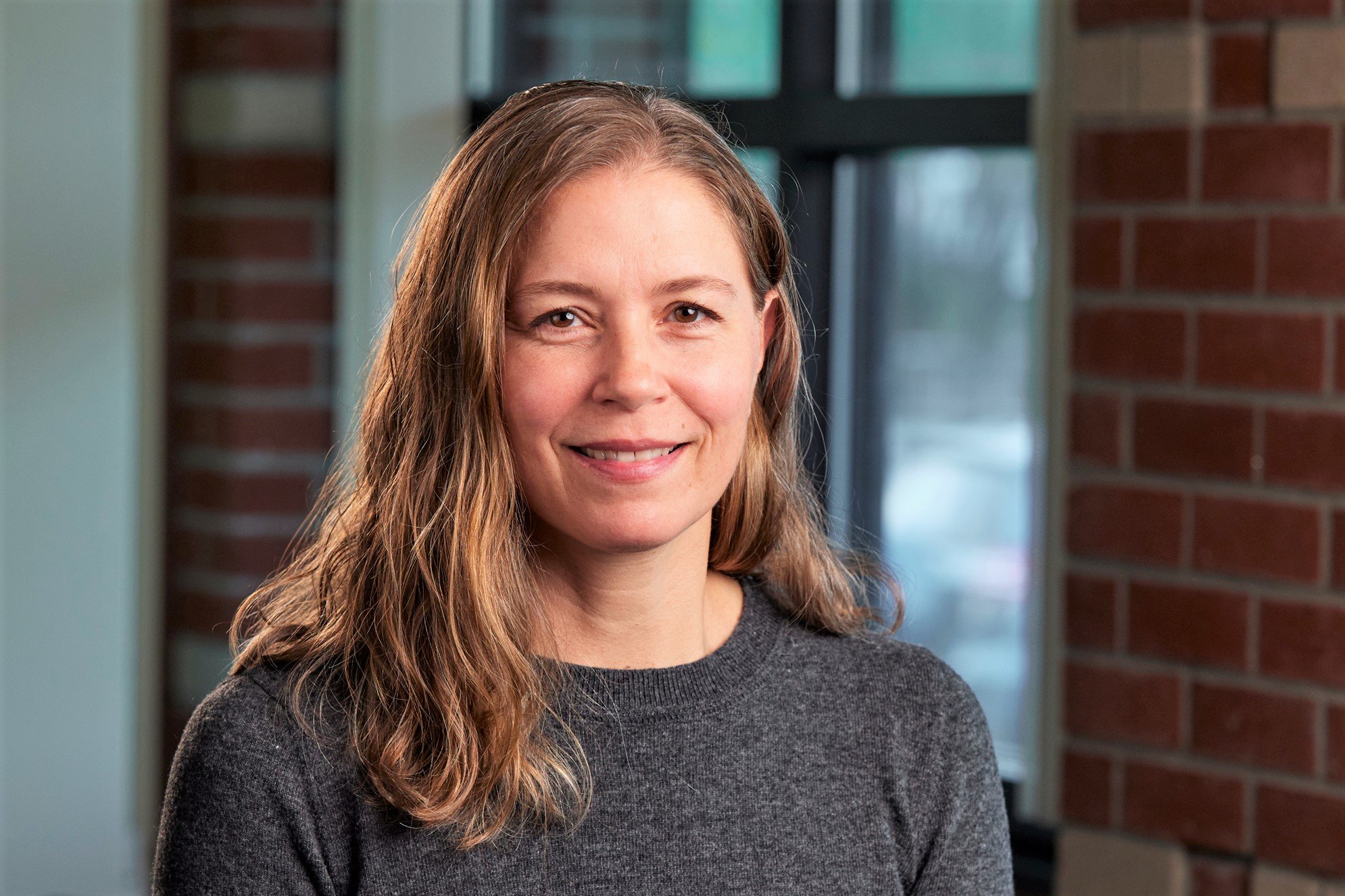Stomach Cancer Care at WVCI
Stomach cancer is one in a group of cancers called gastrointestinal (GI) cancers. They can occur in the GI tract or other organs that make up your digestive system. Stomach cancer, also called gastric cancer, is a disease in which cancer (malignant) cells form in the stomach lining.
Our gastrointestinal cancer doctors are dedicated to helping treat patients throughout Willamette Valley - including Albany, Corvallis, Eugene, Florence, Lincoln City, and Newport, Oregon.
Who's on My Stomach Cancer Treatment Team?
- medical oncologist
- radiation oncologist
- cancer surgeon
- gastroenterologist
- registered dietitian
Willamette Valley Cancer Institute offers patients complete care with a team of specialists. Visiting with an oncologist will help determine the best treatment for your specific diagnosis.
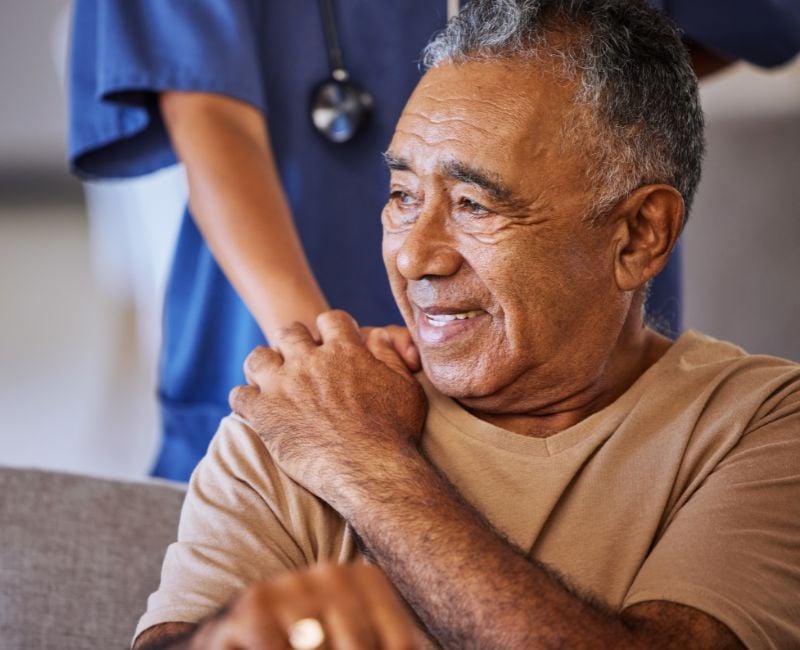
Understanding Stomach Cancer
Take a look at the information here to understand your particular diagnosis of gastric cancer and the factors that determine your treatment options.
Types of Stomach Cancer
The stomach has five layers, and most stomach cancers (90-95%) begin in the mucosa, the deepest layer. This is called adenocarcinoma of the stomach.
Other Rare Types of Stomach Cancers
- Carcinoid tumors start in hormone-producing cells of the stomach but rarely spread to other organs.
- Gastrointestinal stromal tumors (GIST) are rare tumors that start in special cells in the wall of the GI tract (digestive tract). Not all GISTs are cancerous. GISTs can be found anywhere in the digestive tract, but most are found in the stomach.
- Lymphoma is a cancer of immune system tissue, sometimes found in the stomach wall.
Causes and Reducing Risk of Stomach Cancer
Doctors don't know exactly what causes cancer cells to start growing in the stomach. Stomach cancer is more likely to happen if you have a high risk for the disease.
Factors that make you more vulnerable to developing stomach cancer include:
- Infection with a common bacterium called Helicobacter pylori (H. pylori); can also cause stomach inflammation and ulcers
- Inflammation in your gut called gastritis
- Having pernicious anemia or growths in your stomach called polyps
- Being over age 50
- Being male
- Smoking
- Being overweight
- Eating a diet high in smoked, pickled, salty foods or highly processed foods
- Having had stomach surgery for an ulcer
- Having Blood Type A
- Having had an Epstein-Barr virus infection
- Working in coal, metal, timber, or rubber industries
- Exposure to asbestos
- Being a minority – Asians, Pacific Islanders, Hispanics, and African-Americans are more likely to get stomach cancer than Whites
- Having a close family member with stomach cancer
Reducing Your Risk of Developing Stomach Cancer
To help reduce your chances of developing stomach cancer, you can work with your doctor to treat stomach infections or ulcers from H. pylori. It's important to eat healthy and include fresh fruits and vegetables every day. Avoid salty, pickled, cured, highly processed, and smoked foods. Get to and maintain a healthy weight. Don't smoke because it doubles your risk of stomach cancer. If you regularly take aspirin or NSAIDs (Aleve or Advil), talk to your doctor about how these drugs affect your stomach.
Symptoms of Stomach Cancer
Symptoms of stomach cancer can vary from person-to-person; however, here are some of the more common symptoms:
- Frequent indigestion or heartburn
- Poor appetite, or feeling full after eating a small amount
- Weight loss (without trying)
- Stomach pain or cramps
- Discomfort in the belly, usually above the navel
- Bloating
- Blood in your stool
- Diarrhea
- Nausea
- Vomiting
- Fatigue
Patients with more advanced stomach cancer may have weakness, trouble swallowing, yellowing of the eyes or skin, or stomach swelling.
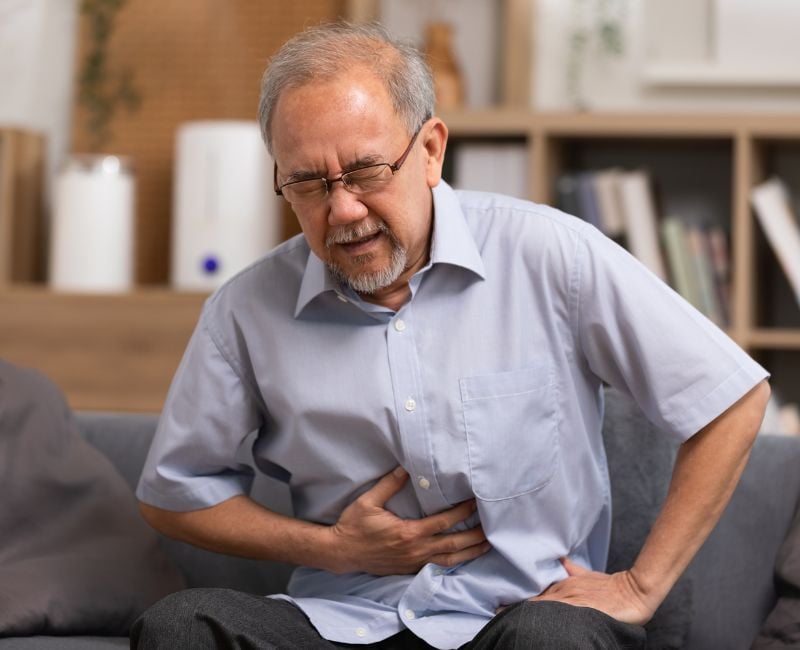
Diagnosing Stomach Cancer
A gastroenterologist is usually the type of physician who diagnoses stomach cancer. This is typically done after identifying symptoms and running some tests such as:
- Blood tests
- Upper endoscopy, which puts a thin, flexible tube with a small camera down your throat to look into your stomach
- Upper GI series requires you to drink a chalky liquid that contains barium to coat your stomach and make it show up clearly on an X-ray
- CT (computed tomography) scan, a very powerful X-ray, shows a detailed cross-section of tissue and can detect tumors
If there is something found during these tests, a biopsy will likely be performed. Often done as part of an endoscopy, a small amount of tissue is removed and studied under a microscope to detect cancer cells.
If the results of the biopsy indicate cancer is present, you will meet with a cancer specialist called an oncologist. There may need to be some additional testing performed to confirm the specific type of stomach cancer and to gather other important information that determines the stage and recommended the treatment plan. These tests may include:
Stomach Cancer Stages
After you receive a stomach cancer diagnosis, your doctor will determine if cancer has spread, and if so, how far. This process is called staging, and it also helps your doctor determine your best treatment options.
Some of the staging information is based on what was found during the biopsy including the size of the tumor. The oncologist will also need to know if the cancer has spread beyond the stomach into lymph nodes and/or other areas of the body. Imaging tests such as a PET/CT scan and an MRI may be used to identify cancer cells that are growing outside of the stomach.
After gathering the information they need, the oncologist will assign a stage. The American Joint Committee on Cancer's (AJCC) TNM system is the staging system most often used for stomach cancer. TNM refers to:
- T: Tumor size and extent of tumors
- N: Lymph node involvement (small organs that are part of your body's germ-fighting system)
- M: Metastasis, whether or not cancer has spread to other areas
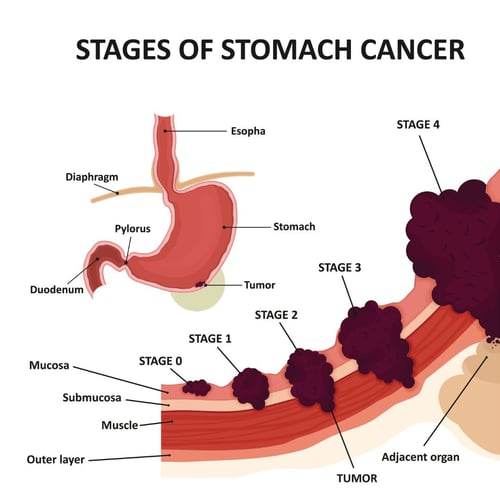
Stage 0 Stomach Cancer
Stage I Stomach Cancer
Stage II Stomach Cancer
Stage III Stomach Cancer
Stage IV Stomach Cancer
Unfortunately, stomach cancer is often in an advanced stage before it is diagnosed because it is slow-growing cancer. Of all stomach cancer cases, about 42% of patients will live for at least one year after diagnosis; 19% will live for at least five years, and 15% will live at least ten years after diagnosis.
Treatment Options for Stomach Cancer
The earlier stomach cancer is discovered, the more treatment options and chances for recovery you will have. Stomach cancer treatments may include:
Stomach Cancer Surgery
Chemotherapy
Radiation Therapy
Targeted Therapy
Biomarker testing is performed on the tissue removed during the biopsy to see if there are changes in the cells or the genetics of the cells that can be targeted by a specific drug. Targeted therapy drugs are available for patients who are positive for HER2 protein overgrowth, NTRK gene changes or VEGF protein overgrowth.
Targeted therapy is often used in combination with other treatments such as chemotherapy.
Immunotherapy
Clinical Trials
Through our affiliation with U.S. Oncology, WVCI's national research partner, clinical research trials are available to patients. Clinical trials often help find better therapies for treating cancer or new medications.
Nutritional Needs For Patients Undergoing Treatment for Stomach Cancer
Nutrition is very important for patients undergoing stomach cancer treatment and recovery. Cancer can make it harder to eat and digest your food. Some patients may receive intravenous (IV) nutrition until they can eat on their own. A registered dietitian and Willamette Valley Cancer Institute's (WVCI) oncology nutritional services can help patients, and their caregivers understand how to get enough nutrition to stay strong during treatment and recovery.
Stomach Cancer Care is Available in the Willamette Valley
Our cancer care team knows it’s essential that you get useful information to choose the best stomach cancer treatment for you. When you’re ready, click the button to make an appointment with one of our GI cancer doctors at a location convenient to you in Albany, Corvallis, Eugene, Florence, Lincoln City and Newport, Oregon.




